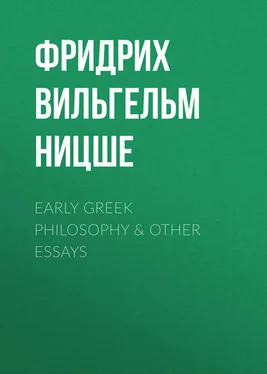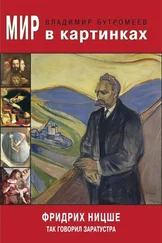Фридрих Ницше - Early Greek Philosophy & Other Essays
Здесь есть возможность читать онлайн «Фридрих Ницше - Early Greek Philosophy & Other Essays» — ознакомительный отрывок электронной книги совершенно бесплатно, а после прочтения отрывка купить полную версию. В некоторых случаях можно слушать аудио, скачать через торрент в формате fb2 и присутствует краткое содержание. Жанр: Философия, literature_19, foreign_antique, foreign_prose, на английском языке. Описание произведения, (предисловие) а так же отзывы посетителей доступны на портале библиотеки ЛибКат.
- Название:Early Greek Philosophy & Other Essays
- Автор:
- Жанр:
- Год:неизвестен
- ISBN:нет данных
- Рейтинг книги:3 / 5. Голосов: 1
-
Избранное:Добавить в избранное
- Отзывы:
-
Ваша оценка:
- 60
- 1
- 2
- 3
- 4
- 5
Early Greek Philosophy & Other Essays: краткое содержание, описание и аннотация
Предлагаем к чтению аннотацию, описание, краткое содержание или предисловие (зависит от того, что написал сам автор книги «Early Greek Philosophy & Other Essays»). Если вы не нашли необходимую информацию о книге — напишите в комментариях, мы постараемся отыскать её.
Early Greek Philosophy & Other Essays — читать онлайн ознакомительный отрывок
Ниже представлен текст книги, разбитый по страницам. Система сохранения места последней прочитанной страницы, позволяет с удобством читать онлайн бесплатно книгу «Early Greek Philosophy & Other Essays», без необходимости каждый раз заново искать на чём Вы остановились. Поставьте закладку, и сможете в любой момент перейти на страницу, на которой закончили чтение.
Интервал:
Закладка:
As long as the State is still in an embryonic condition woman as mother preponderates and determines the grade and the manifestations of Culture: in the same way as woman is destined to complement the disorganised State. What Tacitus says of German women: inesse quin etiam sanctum aliquid et providum putant, nec aut consilia earum aspernantur aut responsa neglegunt, applies on the whole to all nations not yet arrived at the real State. In such stages one feels only the more strongly that which at all times becomes again manifest, that the instincts of woman as the bulwark of the future generation are invincible and that in her care for the preservation of the species Nature speaks out of these instincts very distinctly. How far this divining power reaches is determined, it seems, by the greater or lesser consolidation of the State: in disorderly and more arbitrary conditions, where the whim or the passion of the individual man carries along with itself whole tribes, then woman suddenly comes forward as the warning prophetess. But in Greece too there was a never slumbering care that the terribly overcharged political instinct might splinter into dust and atoms the little political organisms before they attained their goals in any way. Here the Hellenic Will created for itself ever new implements by means of which it spoke, adjusting, moderating, warning: above all it is in the Pythia, that the power of woman to compensate the State manifested itself so clearly, as it has never done since. That a people split up thus into small tribes and municipalities, was yet at bottom whole and was performing the task of its nature within its faction, was assured by that wonderful phenomenon the Pythia and the Delphian oracle: for always, as long as Hellenism created its great works of art, it spoke out of one mouth and as one Pythia. We cannot hold back the portentous discernment that to the Will individuation means much suffering, and that in order to reach those individuals It needs an enormous step-ladder of individuals. It is true our brains reel with the consideration whether the Will in order to arrive at Art, has perhaps effused Itself out into these worlds, stars, bodies, and atoms: at least it ought to become clear to us then, that Art is not necessary for the individuals, but for the Will itself: a sublime outlook at which we shall be permitted to glance once more from another position.
ON MUSIC AND WORDS
What we here have asserted of the relationship between language and music must be valid too, for equal reasons concerning the relationship of Mime to Music. The Mime too, as the intensified symbolism of man's gestures, is, measured by the eternal significance of music, only a simile, which brings into expression the innermost secret of music but very superficially, namely on the substratum of the passionately moved human body. But if we include language also in the category of bodily symbolism, and compare the drama, according to the canon advanced, with music, then I venture to think, a proposition of Schopenhauer will come into the clearest light, to which reference must be made again later on. "It might be admissible, although a purely musical mind does not demand it, to join and adapt words or even a clearly represented action to the pure language of tones, although the latter, being self-sufficient, needs no help; so that our perceiving and reflecting intellect, which does not like to be quite idle, may meanwhile have light and analogous occupation also. By this concession to the intellect man's attention adheres even more closely to music, by this at the same time, too, is placed underneath that which the tones indicate in their general metaphorless language of the heart, a visible picture, as it were a schema, as an example illustrating a general idea … indeed such things will even heighten the effect of music." (Schopenhauer, Parerga, II., "On the Metaphysics of the Beautiful and Æsthetics," § 224.) If we disregard the naturalistic external motivation according to which our perceiving and reflecting intellect does not like to be quite idle when listening to music, and attention led by the hand of an obvious action follows better – then the drama in relation to music has been characterised by Schopenhauer for the best reasons as a schema, as an example illustrating a general idea: and when he adds "indeed such things will even heighten the effect of music" then the enormous universality and originality of vocal music, of the connection of tone with metaphor and idea guarantee the correctness of this utterance. The music of every people begins in closest connection with lyricism and long before absolute music can be thought of, the music of a people in that connection passes through the most important stages of development. If we understand this primal lyricism of a people, as indeed we must, to be an imitation of the artistic typifying Nature, then as the original prototype of that union of music and lyricism must be regarded: the duality in the essence of language, already typified by Nature. Now, after discussing the relation of music to metaphor we will fathom deeper this essence of language.
In the multiplicity of languages the fact at once manifests itself, that word and thing do not necessarily coincide with one another completely, but that the word is a symbol. But what does the word symbolise? Most certainly only conceptions, be these now conscious ones or as in the greater number of cases, unconscious; for how should a word-symbol correspond to that innermost nature of which we and the world are images? Only as conceptions we know that kernel, only in its metaphorical expressions are we familiar with it; beyond that point there is nowhere a direct bridge which could lead us to it. The whole life of impulses, too, the play of feelings, sensations, emotions, volitions, is known to us – as I am forced to insert here in opposition to Schopenhauer – after a most rigid self-examination, not according to its essence but merely as conception; and we may well be permitted to say, that even Schopenhauer's "Will" is nothing else but the most general phenomenal form of a Something otherwise absolutely indecipherable. If therefore we must acquiesce in the rigid necessity of getting nowhere beyond the conceptions we can nevertheless again distinguish two main species within their realm. The one species manifest themselves to us as pleasure-and-displeasure-sensations and accompany all other conceptions as a never-lacking fundamental basis. This most general manifestation, out of which and by which alone we understand all Becoming and all Willing and for which we will retain the name "Will" has now too in language its own symbolic sphere: and in truth this sphere is equally fundamental to the language, as that manifestation is fundamental to all other conceptions. All degrees of pleasure and displeasure – expressions of one primal cause unfathomable to us – symbolise themselves in the tone of the speaker: whereas all the other conceptions are indicated by the gesture-symbolism of the speaker. In so far as that primal cause is the same in all men, the tonal subsoil is also the common one, comprehensible beyond the difference of language. Out of it now develops the more arbitrary gesture-symbolism which is not wholly adequate for its basis: and with which begins the diversity of languages, whose multiplicity we are permitted to consider – to use a simile – as a strophic text to that primal melody of the pleasure-and-displeasure-language. The whole realm of the consonantal and vocal we believe we may reckon only under gesture-symbolism: consonants and vowels without that fundamental tone which is necessary above all else, are nothing but positions of the organs of speech, in short, gestures – ; as soon as we imagine the word proceeding out of the mouth of man, then first of all the root of the word, and the basis of that gesture-symbolism, the tonal subsoil, the echo of the pleasure-and-displeasure-sensations originate. As our whole corporeality stands in relation to that original phenomenon, the "Will," so the word built out of its consonants and vowels stands in relation to its tonal basis.
Читать дальшеИнтервал:
Закладка:
Похожие книги на «Early Greek Philosophy & Other Essays»
Представляем Вашему вниманию похожие книги на «Early Greek Philosophy & Other Essays» списком для выбора. Мы отобрали схожую по названию и смыслу литературу в надежде предоставить читателям больше вариантов отыскать новые, интересные, ещё непрочитанные произведения.
Обсуждение, отзывы о книге «Early Greek Philosophy & Other Essays» и просто собственные мнения читателей. Оставьте ваши комментарии, напишите, что Вы думаете о произведении, его смысле или главных героях. Укажите что конкретно понравилось, а что нет, и почему Вы так считаете.


![Фридрих Ницше - Песни Заратустры [сборник]](/books/28216/fridrih-nicshe-pesni-zaratustry-sbornik-thumb.webp)








